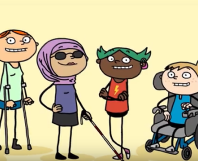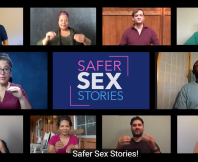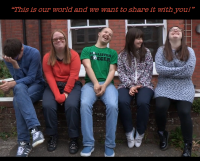Videos
Start conversations about relationships and sexuality
We’ve learned from young people with intellectual and developmental disabilities that videos help them learn. Videos can provide visuals and explanations that young people can watch as many times as they need.
Start conversations about healthy relationships and sexuality with videos, especially those that feature people with disabilities. To get ready to have a conversation with a young person, preview the videos and consider:
- What questions might they have about this video?
- What questions could you ask them about the video?
- What other information would you like to share with them?
- Where might you pause the video? What section might you replay?
Media accessibility
Media player controls can be used to make videos more accessible. Here is more information on ways to adjust videos with the YouTube media player:
Suggested videos
The National Council on Independent Living’s video project helps people with I/DD learn about sex. These videos feature people with I/DD and use language that is inclusive of many genders. The videos cover many topics such as puberty, sexually transmitted infections (STIs), condom use, masturbation, and preventing pregnancy when someone does not want to become pregnant. Because some of the videos feature images of sexual body parts, YouTube may ask for age verification.

AMAZE aims to create age-appropriate animated videos for adolescents ages 10 to 14. It also offers parents and educators resources to open lines of communication about important sexual health topics, including healthy relationships, puberty, gender identity, sexual orientation, personal safety, pregnancy and reproduction, and sexually transmitted infections and HIV.

Safer Sex Stories is a 12-part video series from Health Signs Center, an organization that promotes and advocates for the health, health equity, and health access for the deaf community. This series provides information about HIV and STI prevention and testing, as well as accessing reproductive and sexual health services. The videos use American Sign Language (ASL) with voiceover narration.

The Specials is a documentary series following the lives of Sam, Hilly, Lucy, Lewis and Megan, 5 friends with intellectual disabilities who share a house in Brighton, UK. You can view trailers and clips of episodes on The Specials YouTube channel and can purchase a subscription to the show on their website.
Real Talk is a resource from Canada that includes videos for adults with intellectual disabilities having conversations about sexual health topics, including dating, relationships, love, and pleasure. The videos include people with a wide range of identities and experiences. Explore the tabs on the Videos page to learn more about the topics discussed in the videos and how you can continue the conversation.
Some suggested Real Talk videos
- Intro to Real Talk (5-7 min) - Introduction to how to use the Real Talk videos for people with disabilities and for support people
- How should family and staff support your love life? (3.5 min) - “Lots of people get support from family or staff for different things. Sometimes people need support in order to have a love life…In this video, people talk about what happened when they first told their families and staff that they wanted to go on dates.”
- What does it mean to be trans? (3 min) - “Galen, Corey, and Olivia share what they feel being a trans person means to them. They discuss how they identify, the difference between gender euphoria and dysphoria, and which pronouns they use.”
- Have you ever wanted a partner but couldn’t find one? (2.5 min) - “Wanting to have a partner and not being able to find one can be frustrating. It’s also a very common experience. In this video, people talk about what it was – or is – like for them not being able to find a partner, and what they do to keep themselves in a good headspace about it all.”
- What does consent mean? What does it feel like? (3.5 min) - “We hear a lot about consent these days. But what does it mean to consent to something? In this video, people talk about what consent means – when it comes to sex, and when it comes to other things in life.”
- Have you ever wanted to be pregnant? Or to prevent pregnancy? (2 min) - “In this video, people talk about whether they’ve ever wanted to have a baby, and what they’ve done to prevent pregnancy if they don’t want to have a baby.”
- Hi, I’m Dee—A Real Talk Comic Book (3.5 min) - Real Talk comics include discussion questions and resources (often specific to Canada). Here’s Dee’s story: “Since childhood, people have been using words for Dee that don’t seem right. Now Dee is learning more about other people who don’t fit the words “woman”, or “man”, or “girl”, or “boy”. There are some obstacles, but Dee is figuring things out, and has big hopes for the future.”

